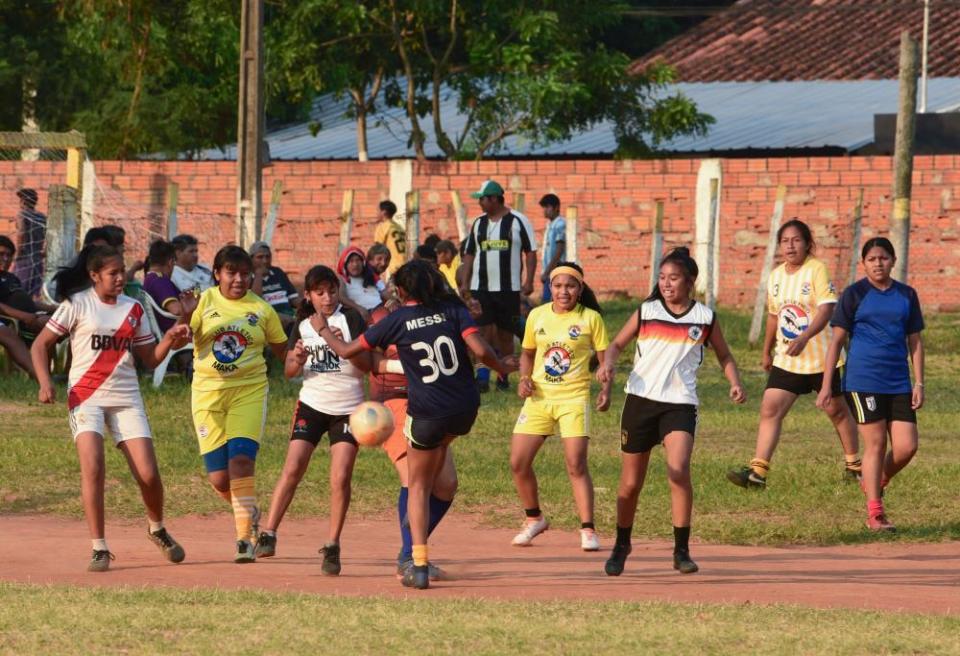Deportivo Guaraní make football history as first Indigenous women’s team in a major final
Rosa Carema, 20, spends her days harvesting squashes on farms in the province of Salta in northern Argentina. But when the blazing sun sets over the Gran Chaco plains, she dons a tracksuit and heads down to the football pitch in her Ava Guaraní community, on the outskirts of the town of Pichanal.
Carema plays for the women’s football team at Club Deportivo Guaraní, a club based in the community of Misión San Francisco. On Saturday, she and her teammates will make history when they step on to the pitch for the final of the Copa Salta. They will be the first team from an Indigenous community to reach the final of a major tournament in the province.
Reaching the final has been a huge achievement for the team, which formed six years ago. To get there, they have had to overcome sexism, racial slurs, threats and attacks because of their Indigenous background.
“[Rival teams tell us] we’re nothing … that we don’t know what we’re doing or where we’re going,” Carema says. “They’re annoyed because they can’t get as far as we can, because we go with faith, with our head held high.”
Carema has been playing football since she was five. Like many of her teammates, she first discovered the joys of the sport kicking a ball around in the streets with her friends. As she grew up, those around her started to tell her it was a man’s game. She ignored them.
“They used to challenge me at home [for playing women’s football], but I just acted like I couldn’t hear it,” she says from the sidelines of Club Guaraní’s dusty pitch. “Now they’re proud of me, and I’m grateful to them.”
The prejudice directed at the women reflects broader problems with structural poverty, institutional discrimination and a failure to respect Indigenous people’s rights in Argentina.
About 6.5% of Salta’s population identifies as Indigenous, and 513 of the country’s 1,790 Indigenous communities live in the province.
Poverty rates in the province are among the highest in the country. A state of emergency was declared in three departments in 2020 after several Wichí children died of malnutrition.
Although official statistics are scarce, sexual violence against Indigenous women and children is widespread in northern Argentina.
“[Playing football] is a really powerful feeling,” says team captain Dulce Rueda. “I mean, we all like winning, but when we lose and we known we gave it our all, that gives us a sense of satisfaction too.”
The 30-year-old only started playing football 10 years ago. When she’s not on the pitch, Rueda works in construction. “Sometimes there, too, people say that a woman can’t do that kind of work, and yet I’m doing it,” she says as a ball clatters against a chainlink fencing.
Rueda was hospitalised after Club Guaraní beat a more established team in July. “There was a threat from the girls beforehand that if we were the champions, we wouldn’t get out of there in one piece,” she says. “They practically broke my ankle and knee.”
The team’s members are of mixed ethnicity – Rueda has African-Argentine heritage – but that makes little difference when it comes to abuse.
“They tell us to go and dance [traditional indigenous dance] pim pim,” says coach Johana Palacio, who founded the team with her mother. “They say that people from Misión San Francisco don’t know how to speak properly, that they don’t wear shoes … Just for living in the mission [Indigenous community], they discriminate against you.”
Women’s football is growing in Salta. More than 40 women’s football clubs are now formally registered in the Salta league and countless small neighbourhood teams have sprung up, according to Belén Morelli, president of the Salta association of women’s football. She says there’s been a marked growth in the number of teams from Indigenous communities.
Rising interest in women’s football among Indigenous groups is reflected across Latin America. In January, a team of Maká women in Paraguay signed up to their regional league for the first time, and the Bolivian department of Cochabamba held its first football tournament exclusively for Indigenous women earlier this year.

Women’s football in Argentina still has some way to go to achieve the same status and investment as the men’s game. The first formal women’s league was not created until 1991 and it wasn’t until 2019 that female players first signed professional contracts.
In Salta, the men’s Cup prize money is 700,000 Argentinian pesos (£4,297): twice as much as the women’s winnings.
Related: Discipline, teamwork, acceptance: why football is a lifeline for queer Cambodian teens
“There’s not a single woman in Salta who earns a living from playing football,” says Claudia Catalano, sports and gender coordinator at Salta province’s secretariat of sport, largely due to lower ticket sales for women’s matches and difficulties securing sponsorship.
Catalano adds the secretariat is running training sessions to fight discrimination.
The mood in Misión San Francisco is optimistic about the future of women’s football. “[I would tell] young girls who play football to never give it up,” Carema say, as her teammates started to jog around the dusty pitch in the light of the setting sun. “The ball is your friend.”
Sign up for Her Stage to hear directly from incredible women in the developing world on the issues that matter to them, delivered to your inbox monthly:

 Yahoo Sport
Yahoo Sport 





































